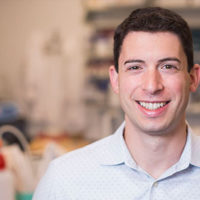A team of Vanderbilt engineers, biologists and education specialists have received a $3 million grant from the National Science Foundation to advance large-scale biomanufacturing of cell-derived nanoparticles that can deliver precisely targeted drugs to the site of a disease.
“Biomanufacturing is a growing but critical field that is reshaping how we diagnose and treat some of the most devastating diseases known to humanity,” said Jamey Young, Cornelius Vanderbilt Professor of Chemical and Biomolecular Engineering and principal investigator on the four-year grant. “Vanderbilt is uniquely well-suited to help advance the future of biomanufacturing, given our deep expertise in molecular and nano-engineering, cellular biology and medicine, and education methodologies.”
The grant is part of the NSF’s Future Manufacturing program that is designed to support fundamental research, as well as education and workforce training, to spur novel manufacturing technologies and processes.
Co-principal investigators include Ethan Lippmann, associate professor of chemical and biomolecular engineering; Dr. Alissa Weaver, Cornelius Vanderbilt Professor of Cell and Developmental Biology and director of the Vanderbilt Center for Extracellular Vesicle Research; and John Wilson, associate professor of chemical and biomolecular engineering.
Much of the group’s work focuses on the development and large-scale production of extracellular vesicles (EVs), particles that are secreted by cells and capable of delivering highly precise therapeutic payloads—materials such as proteins, nucleic acids and metabolites—to cellular targets.
In addition to designing EVs with tunable properties and drug payloads, the group also seeks to develop technologies for scalable manufacturing of “designer EVs” that can be produced cost-efficiently in large quantities from virtually any cell type. In parallel with their research efforts, the team will seek to create high-school and college learning modules to equip a broad spectrum of learners in advanced biomanufacturing techniques.
“EVs are of great interest as delivery vehicles for therapeutic molecules; however, a number of barriers need to be overcome, requiring a multidisciplinary approach,” said Weaver, also professor of pathology, microbiology and immunology. “One of the major goals of the Vanderbilt Center for EV Research is to bring together EV researchers with complementary expertise for impactful multi-PI projects like this one.”
Weaver added that this trans-institutional project brings together investigators with expertise in drug delivery (Wilson), stem cell engineering (Lippmann), biomanufacturing (Young) and EV cell biology (Weaver). The EV center provided support for this grant application through instrumentation, training, pilot funds, communication, travel support for trainees and enrichment of the intellectual environment.
The global market for diagnostic and therapeutic EVs is projected to reach $2.9 billion by 2030. Currently there are as many as 20 clinical trials underway for EV-based interventions for conditions that include COVID-19, heart attacks, autoimmune disease and various cancers.




